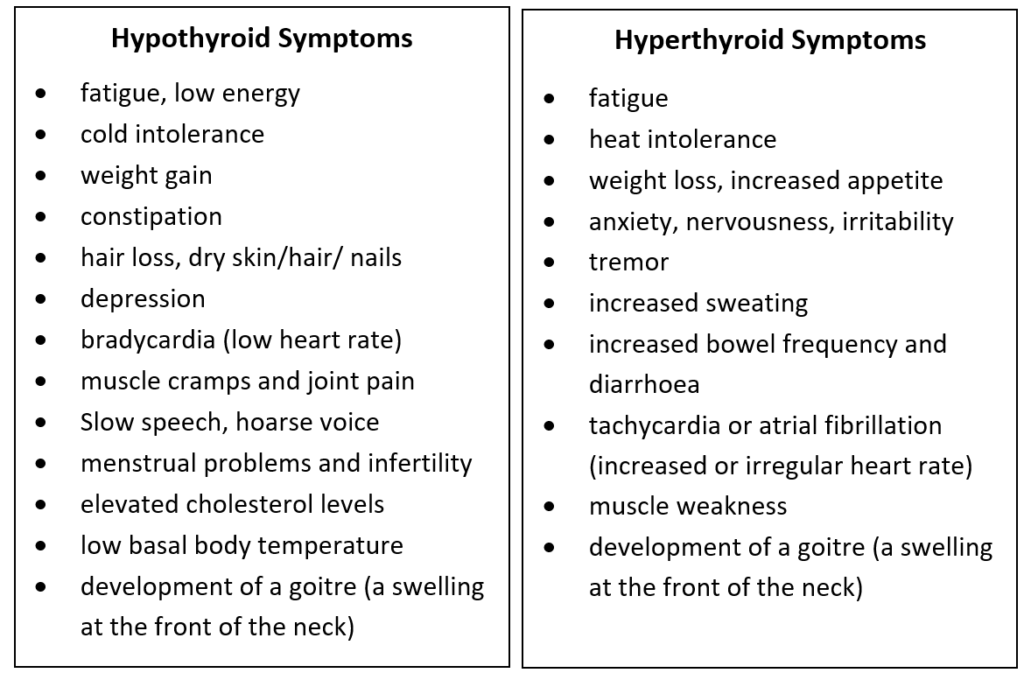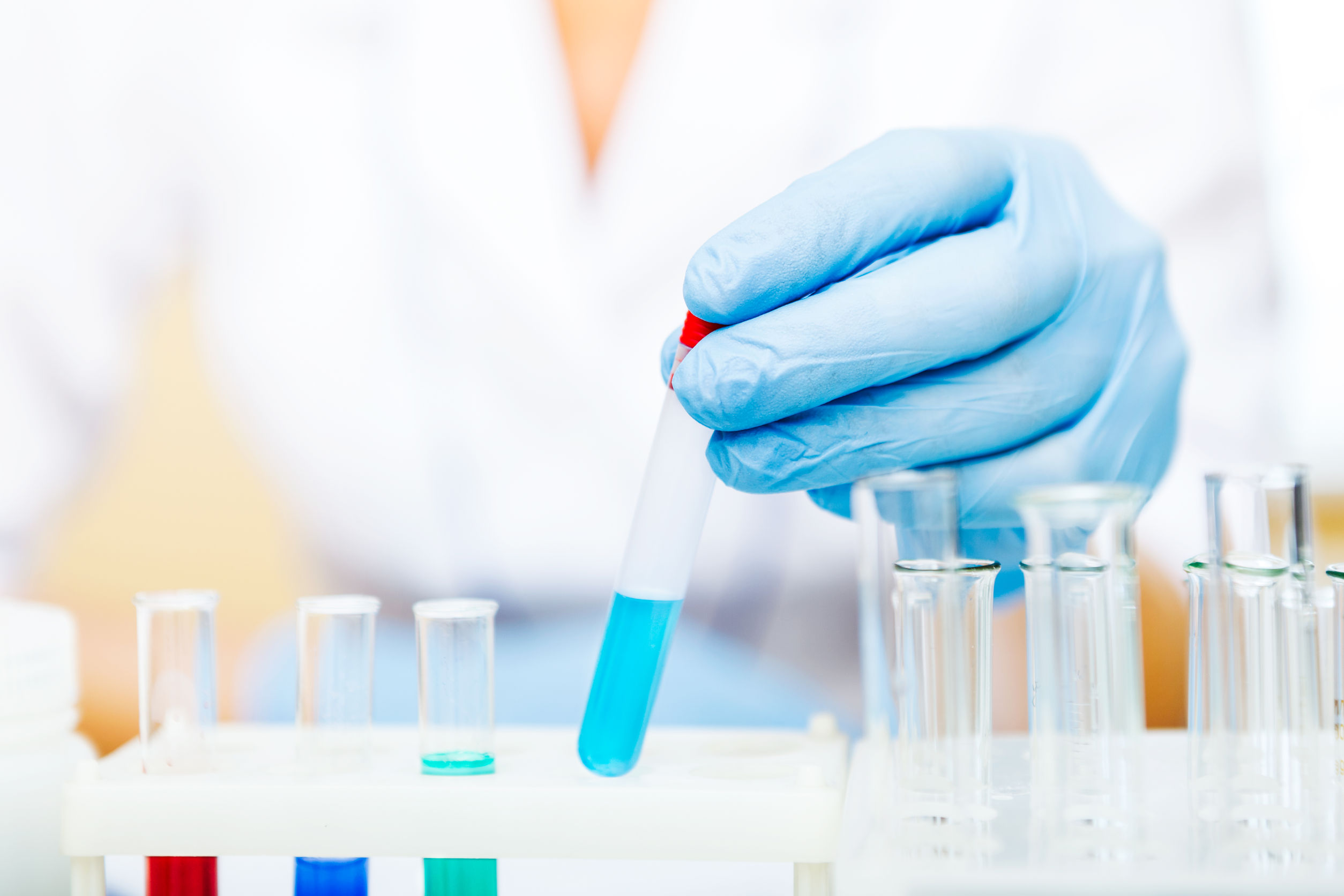Your Plan of Action – the natural approach
Test for thyroid antibodies and find out which approach is best for you
Use nutritional supports and an anti-inflammatory diet to reduce thyroid antibodies and possibly slow the progression of the condition
Talk to a nutritionist about whether a gluten-free diet is useful and how to adopt this diet safely without compromising your nutrition
If your condition is not autoimmune in nature, find out if nutritional deficiency may be the cause. You can then rectify the deficiency and support thyroid function
Best test options: Thyroid tests, Thyroid Nutrients Panel
The thyroid gland is part of the endocrine system and is responsible for controlling the metabolic rate (or pace) of all the processes in the body. If there is a deficiency of circulating thyroid hormones, thyroxine (T4) and triiodothyronine (T3), every function of the body tends to slow down. Conversely if there is over production of thyroid hormones, the metabolic rate speeds up.
Hypothyroidism (under active) usually occurs in later life with many women being diagnosed in their thirties and beyond. This may be as a result of various hormonal upheavals such as pregnancy. The most common cause of hypothyroidism is an autoimmune condition called Hashimotos’s thyroiditis. Hypothyroidism can also be caused by a dysfunction of the hypothalamus (part of the brain) or the pituitary gland, both of which are involved in the control of the thyroid gland. Hypothyroidism can also be caused by a lack of dietary iodine or other supporting nutrients. These are simply the raw materials that your thyroid needs to make hormones and to do its job. Without them, the thyroid gland may slow down and not function adequately.
Hyperthyroidism (over active) is most commonly caused by an autoimmune disease known as Graves’ disease, a hyperplasia and hypertrophy (an increase in the number and size of cells) of the thyroid gland. Hyperthyroidism may be hereditary, caused by emotional stress or unknown factors.
The symptoms of hypothyroidism (under active) and hyperthyroidism (over active) may seem like opposites of each other, but in reality a number of symptoms cross over and different sets of symptoms manifest in different individuals. We have often seen the hypothyroid patient who cannot put on weight so do not feel like your symptoms have to define you. It is also worth mentioning that these symptoms have a lot of cross over with other conditions and imbalances. If you have a thyroid condition and are still feeling very poorly, it might be that good nutrition can help. It might also mean there is more than one thing going on for you.
Thyroid Hormones
Thyroid stimulating Hormone (TSH)
TSH is the hormone produced by the pituitary gland that helps control the thyroid gland. TSH prompts the thyroid gland to make more thyroid hormones and usually increases when T3 and T4 levels drop. When T4 and T3 levels become too high this switches off the production of TSH, by the pituitary, telling the thyroid to slow down production of thyroid hormones.
Thyroid hormones
T4 is the major hormone produced by the thyroid gland and a synthetic form of this hormone is provided by levothyroxine (Eltroxin). T3 is the more active hormone and conversion from T4 to T3 is important to measure. If T4 and T3 levels are normal despite an abnormal TSH, this may indicate an issue with the pituitary gland or reduced uptake of thyroid hormones into your cells. Reverse T3 (rT3) is produced as a secondary product and is not metabolically active. There may be an increase in rT3 during conditions of stress.
Thyroid antibodies
Thyroid antibodies (anti-thyroglobulin and anti-thyroid peroxidase) are found in autoimmune thyroiditis, the most common forms of hypo- or hyperthyroidism (Hashimoto’s or Grave’s Disease). It is important to differentiate between autoimmune thyroid conditions and non-autoimmune as the nutritional approach is quite different. In addition, if you already have thyroid antibodies, even though your thyroid hormones are currently in the normal range, this can indicate an increased risk of developing a thyroid condition in the near future.
If you take steps to reduce your antibodies, it may slow the progression of the condition. You can ask your GP to measure your thyroid antibodies along with your thyroid function tests. If this cannot be carried out, ask us about measuring these with our clinic. Can Nutrition Help? We adopt a number of approaches to support a reduction in thyroid antibodies, including nutritional approaches to calming the immune system. An anti-inflammatory diet includes more omega-3 rich fish and less red meat and processed foods. We also use medicinal mushrooms as they have very powerful immune modulating effects. If the cause of thyroid dysfunction is a nutritional deficiency, identifying and rectifying this deficiency can restore function. It is very important not to over-supplement without testing as this can seriously affect your thyroid function. Digestion, leaky gut, gluten, autoimmunity and more.. Another important area to look at is our digestive system. Much of our immune system surrounds our gut – up to 80% of it in fact. Therefore, there is a strong link between our digestive health and our immune system. If you suffer from digestive issues such as bloating, constipation, diarrhoea or food intolerances, this may be a possible source of inflammation for you. Gluten may also be an issue for you. Antibodies against gluten have been shown to cross-react with thyroid tissue and a gluten-free diet has been shown to reduce thyroid antibodies. Our comprehensive stool analysis can identify markers of intestinal health and some critical bacterial imbalances that may be associated with thyroid antibodies. There is also an association with small intestinal bacterial overgrowth (SIBO). You may have symptoms of IBS (irritable bowel syndrome) which could be an indication that this is an issue for you. Some people have no digestive symptoms even though it is still a critical source of inflammation. Studies also show that taking 200ug of selenium as a supplement for three months can reduce thyroid antibodies. It is important not to over-supplement with selenium for a long period however and this is not advisable in hyperthyroidism as it may stimulate. This level of supplementation should be carried out under the advice of your nutritionist. Iodine The most common cause of hypothyroidism alongside autoimmune conditions is a deficiency in iodine. It is important to know your iodine levels before you supplement as where some people are deficient, others have excess iodine. Over-supplementing may have adverse effects by speeding up your thyroid or increasing thyroid antibodies, so it is also essential to know whether your condition is autoimmune or not. Iodine is found in fish, dairy and seaweed products although the quantities in seaweed products varies considerably. Read our published paper here about the importance of testing for iodine and how it can support your thyroid health. It is worth noting that fluoride in mains water in Ireland interferes with iodine uptake in the thyroid. If necessary, a fluoride filter can be installed, which must use reverse osmosis to remove iodine unlike a regular water filter. Other Minerals Selenium, zinc and magnesium play a critical role in the production of thyroid hormones. Deficiency in these or iodine can be a major cause of hypothyroidism and if identified, can be supported through nutritional modifications and supplements if necessary. Zinc and magnesium are particularly common deficiencies identified in our clinic. Both are found in nuts and seeds but zinc malabsorption is common. Vitamin D This is a crucial vitamin in modulating the immune system. Both excess or deficiency states have negative effects on your immune cells and maintaining the correct levels is important in immune-mediated thyroid conditions. Be cautious when supplementing with vitamin D as it can be toxic at high levels. In Winter, approximately 50% of Irish adults may be deficient but we also see people in clinic who have supplemented too much. Iron If you have hypothyroidism, it may be that you do not absorb iron very well. An iron deficiency could easily exacerbate feelings of fatigue which you may put down to your thyroid funciton. It is important to get your iron levels checked including your ferritin, trasnferrin saturation (called iron studies) and a full blood count. If you do need to increase your levels, we recommend iron citrate. Avoid taking iron in the form of ferrous sulphate (also called iron sulphate), which is less easily absorbed by the body. Only 2 to 10 percent of the iron from this type of iron supplement is actually absorbed by your body, and even then, half is eliminated, causing blackening of your stools and constipation. Good sources of iron include red meat although this should be limited in the diet for other health reasons. Iron can also be found in high levels in lentils, beans and beetroot but absorption from plant sources is low. We need to consume vitamin C with these plant sources in order to increase absorption. Calcium If you have a thyroid condition, it is very important to consider your bone health as calcium absorption and metabolism in the body (managing where it’s going to do it’s job) is altered. Good quality dairy products such as natural yoghurt, organic or goats milk and kefir are good sources of calcium if you include these in your diet. Milk alternatives are usually fortified with good levels but you need to check the labels. Other sources include tinned fish with bones, tofu, almonds, sesame seeds, chia seeds and broccoli. Other considerations in hyperthyroidism If your metabolism is running very rapidly, you may have greater requirements for certain nutrients such as the B vitamins, zinc. Some amino acids may also support regulation of the thyroid. Magnesium may also be helpful and is useful to support stress and promote relaxation. It is important to manage stress and incorporate relaxation into your daily routine while you are trying to deal with symptoms of hyperthyroidism. Tests Certain tests may be carried out by your GP. We can liaise with your doctor to provide nutritional support. Additional thyroid testing can be carried out with our clinic. We offer comprehensive panels including antibodies and all hormones. Our Thyroid Nutritional Profile was specifically designed to measure minerals and vitamins that are necessary for thyroid function. This includes urine iodine. You should not supplement iodine without knowing whether you have thyroid antibodies or whether you are indeed deficient.
Where to start?
Find out whether your thyroid antibodies are raised. Talk to our nutritionist about a protocol aimed at reducing thyroid antibodies. If you do not have thyroid antibodies, ask about how we can support your thyroid and find out if a nutrient deficiency is impairing your thyroid function.




